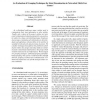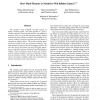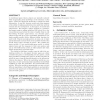1617 search results - page 37 / 324 » Knowledge Condition Games |
115
click to vote
MASCOTS
2001
15 years 3 months ago
2001
In a distributed multi-user game, entities need to communicate their state information to other entities. Usually only a subset of the game's entities are interested in infor...
113
click to vote
ICC
2008
IEEE
15 years 8 months ago
2008
IEEE
Abstract—The downlink transmission in multi-user multipleinput multiple-output (MIMO) systems has been extensively studied from both communication-theoretic and information-theor...
137
click to vote
FLAIRS
2008
15 years 4 months ago
2008
Combining probability and first-order logic has been the subject of intensive research during the last ten years. The most well-known formalisms combining probability and some sub...
106
click to vote
LICS
1997
IEEE
15 years 5 months ago
1997
IEEE
We consider a class of infinite two-player games on finitely coloured graphs. Our main question is: given a winning condition, what is the inherent blow-up (additional memory) of ...
130
click to vote
SIGECOM
2006
ACM
15 years 8 months ago
2006
ACM
In traditional game theory, players are typically endowed with exogenously given knowledge of the structure of the game—either full omniscient knowledge or partial but fixed in...



